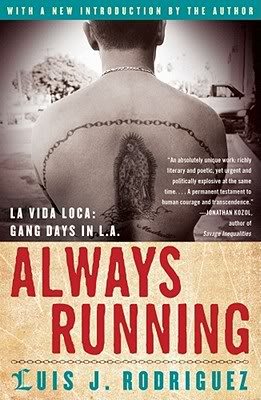In this powerful autobiography, Luis J. Rodriguez relates stories from his youth growing up in an impoverished East Los Angeles barrio. The son of Mexican immigrants, from an early age Rodriguez constantly faces barriers to success from a system designed to keep him out. As a result, Rodriguez and his peers are forced to invent the rules they will live by as they seek validation and protection in the troubling world of gang life.


Rodriguez brings alive his teenage years through vivid accounts of robberies, shootouts, drug use, gang rivalry and youthful sexual exploits. Despite the barrio’s firm grip on his life, Rodriguez’ inner desire to break free and make more of himself is evident. As his boxing coach constantly reminds him, he has the jaspia (hunger) necessary to succeed.
First published in 1994, this book came out after the infamous L.A. riots of 1992, but it provides an important historical account of barrio life in Los Angeles during the 1960s and 1970s. The young people in Rodriguez’ neighborhood faced layer upon layer of discrimination and racism, from exclusion and alienation at school, to constant surveillance and heavy-handed tactics by local police.
Through involvement in the Chicano movement in the late 1960s, Rodriguez starts to make connections beyond his own personal situation to the wider political and sociocultural factors that influence life in the barrio. This is probably precisely why the book is banned in Arizona: the book implicates police brutality in perpetuating gang culture; it illustrates the extent of racism inherent in the public system; and, crucially, it outlines some of the revolutionary ideas of the early Chicano movement.
In the short clip below, Rodriguez explains that gang life took hold of him at the tender age of 12. By the age of 18 he had lost 20 of his friends to la vida loca and he was facing a six-year jail term for assault with a deadly weapon.
Despite the incredible odds stacked against him, Rodriguez was one of the fortunate ones able to make a break from the barrio through a combination of education and his budding literary ambition—”when you read books whole worlds open up to you, even though your world is so limited that you think there is no way out of it”.
Truly inspiring, this book covers important issues as relevant today as they were 50 years ago.
***
Jen Wilton currently lives in Oaxaca, Mexico and reports on social and political issues related to Mexico and Latin America more widely. Jen tweets as @guerillagrrl and blogs at revolutioniseternal.wordpress.com.
***
Please support these #LatinoLit bookstores before you buy anywhere else:
La Casa Azul Bookstore, New York, NY: http://www.lacasaazulbookstore.com
Tía Chucha Cultural Center, Los Angeles, CA: http://www.tiachucha.com
Resistencia Bookstore, Austin, TX: http://www.resistenciabooks.com
Casa Ramírez, Houston, TX: 241 W 19th St – (713) 880-2420
EN ESPAÑOL
Librería Barco de Papel, Queens, NY: http://libreriabarcodepapelny.com
Girón Books, Chicago, IL: http://www.gironbooks.com
Librotraficante Underground Library locations in AZ, NM and TX: http://www.librotraficante.com/index.php/underground-library/locations



I’ve seen a feature with Louis Rodriguez before, but I can’t remember from where. This one click purchase thing on Amazon is great, but it’s draining my bank account. I love reading stories about people that make their way back from street life.